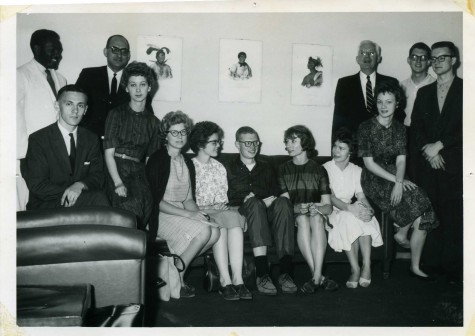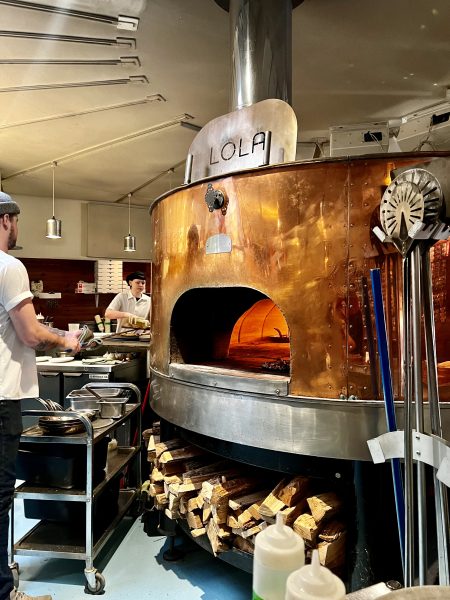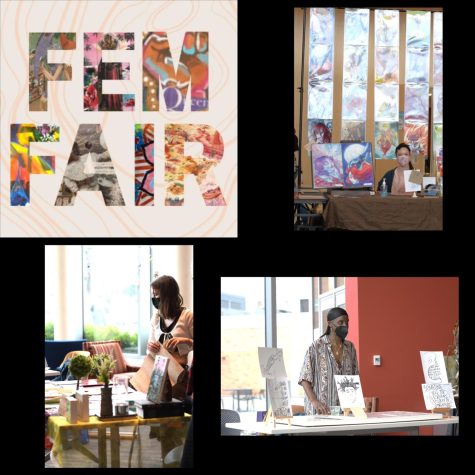SPAN: Reflections from an alum
September 24, 2014

Two Hamline students were part of the SPAN group that landed in Casablanca, Morocco, in June 1962. They are Evelyn Hovda Anderson, seated on the arm of the sofa at right, and William Clute, standing at far right.
52 years ago, and I was a shy Hamline sophomore, the first person in my family to go to college. I wrote some articles for the The Oracle and was leaning toward a journalism major. Thanks to a Hamline professor who saw something in me that I didn’t know was there, I had a life-changing experience through SPAN, the Student Project for Amity -among Nations. Even after all these years, I consider the SPAN experience a landmark event in my life.
My English professor, George Vane, suggested that I apply to SPAN, an organization founded by students. SPAN was preparing to send groups to four countries in the summer of 1962: Greece, Peru, Nigeria, and Morocco. He suggested Morocco as a destination for me, because I had taken some French language classes. As my research topic, I decided I wanted to explore the status of women in Morocco, including the meaning of the veil. Another Hamline student, Bill Clute, also in the Morocco group, studied the educational system in the newly-independent country. Our Morocco SPAN group of 10 had students from four other Minnesota colleges as well.
SPAN is still active more than a half-century later, and Hamline students are eligible to participate. Since SPAN’s inception in 1947, 90 Hamline students have traveled with SPAN—studying, researching and traveling to countries as diverse as Cameroon, Switzerland, Ghana, Micronesia, Thailand, Portugal and Yugoslavia.
In 2015, SPAN intends to send two groups of students: one to Germany and the other to the Republic of Armenia and neighboring Georgia, a former Soviet Union state. Just as I did a half-century ago, the 2015 SPANners will prepare for their international research experience by meeting as a group and working independently as they develop their individual research projects, make contacts abroad, learn about their host countries , and arrange for transportation and housing overseas.
Our 1962 academic advisor, Mohamed Selim, Ph.D., of the University of St. Thomas, had many personal and professional contacts in Morocco and spoke Arabic fluently. SPAN selects faculty advisors based on their experience in the destination country and their effectiveness as teachers and mentors.
SPANners, as they are called, enjoy an eight-week in-country summer stay. While abroad, they carry out a research project on
their self-chosen topic. This can involve interviews with experts, site visits, library research, or whatever kind of field studies the SPANner decides can result in a successful research project. I was the reserved Minnesota student conducting interviews with Moroccan leaders in French, rehearsing the questions carefully and hoping I would understand the answers!
Once SPANners return home, just as I did, the 2015 students will synthesize their research findings and write a substantive paper, approximately 50 pages in length. SPAN provides guidance for this process so the finished content and format is much like a master’s thesis. SPAN students who apply for graduate school find that the SPAN paper is a valuable asset. SPAN is one of the few programs that help undergraduates do independent research.
The SPAN experience helped me develop my self-confidence, curiosity, interviewing skills, problem-solving ability, cross-cultural understanding, and international interests. I learned to live on a very tight budget, staying in hostels, dorms and with a family for an unforgettable week in the walled medieval city of Fez. SPAN alumni provide scholarships to help make the experience possible for current students.
If you are adventurous, independent-minded and a strong student with international interests, consider applying for SPAN. You can contact SPAN directly (see box) or contact John Mazis, Ph.D., Hamline professor of History, at jmazis@hamline.edu. Mazis was a SPANner to Greece in 1995 and serves on SPAN’s executive board.
You might still be talking about your experience 50 years from now!


